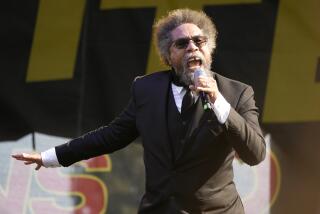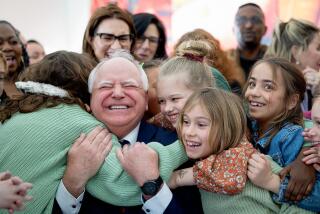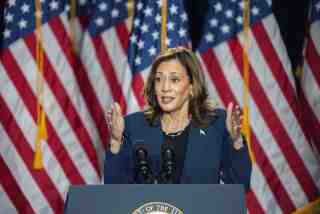Inside Politics Distracts Gore’s Campaign Team
WASHINGTON — At times this summer, Al Gore’s race for the White House has seemed scripted less by Theodore White than Danielle Steele. New campaign aides are squabbling with old ones, key staffers are fretting about how they fit in and the man brought in to ensure order is instead sparking controversy.
The intrigue has some Democrats worried that Gore’s advisors may be too busy elbowing each other to fully engage the vice president’s principal rivals: Democrat Bill Bradley, the former senator from New Jersey, and Republican Texas Gov. George W. Bush, the front-runner for the GOP nomination.
“All campaigns have these problems, but this is over the top,” says one Democratic congressional aide close to the campaign. “You have a group of people who have to spend two years together working for a common goal, and if they have to spend their time worrying, ‘Am I going to keep my job?’ it’s a problem.”
The turmoil has raised questions in some quarters about Gore’s management style. Few are surprised he’s brought in some new advisors; after all, he’s trailed Bush by double-digit margins in the polls all year. What’s caused concern, though, is that Gore has added the new aides without removing any old ones. That has led Democrats to fear that he seems reluctant to make tough decisions, while others worry that he may be trying to hedge his bets with all of his party’s factions.
“Trying to read too much into staff changes in campaigns is usually a mistake,” said one longtime centrist advisor to Gore. “But part of what you have to look at is does this reflect a mentality of trying to cover all bases.”
The sheer scale of Gore’s operation was driven home by campaign finance reports filed this week. In the first half of this year, the vice president spent 73% more on salaries and overhead than Bradley, according to an analysis for The Times and CNN by the nonpartisan Campaign Study Group.
Always top-heavy with competing centers of power, Gore’s effort has grown even more fractious as newly installed campaign chairman Tony Coelho has moved to assert his control.
In doing so, Coelho hired a new message guru named Carter Eskew, who’s been embroiled in a nearly decade-long feud with a former business partner who also happens to be Gore’s current media advisor, Robert Squier.
Coelho also added a pollster, Celinda Lake, who has been predicting doom for Democrats who don’t distance themselves from President Clinton--a view diametrically opposite that of Gore’s existing pollster, Mark Penn, who also happens to conduct Clinton’s surveys.
Power Flows Toward Coelho
Meanwhile, sources say Ronald Klain, the highly regarded chief of staff in Gore’s vice presidential office, has been considering whether to quit as power has drained away toward Coelho.
These types of tensions are polarizing opinion about Coelho, the former Merced, Calif., congressman Gore plucked from the business world this spring--after nearly a decade out of politics--to direct his campaign.
Gore named Coelho partly in response to criticism that he was micromanaging the campaign himself. Coelho’s supporters say he is trying to impose order and streamline the hierarchy in an organization that had quickly become known for indecision.
But others charge Coelho is moving mostly to strengthen his own position and demonstrate that he is in control--the equivalent of former Secretary of State Alexander M. Haig’s “I am in charge” declaration after Ronald Reagan was shot in 1981.
Coelho “wants to be the one power center, so he is destabilizing all the other power centers,” said one longtime Gore supporter. “But I don’t think he’ll be completely successful.”
Coelho declined to comment.
This backbiting may be remote to most voters, but it’s riveted much of the Washington political world, especially after Squier took his grievances public in an interview with the New York Times last week.
Such infighting is hardly unique--or even fatal--to presidential campaigns. In 1996, Clinton won reelection even though several of his key operatives--particularly liberal White House aides Harold M. Ickes and George Stephanopoulos--despised his chief strategist, Dick Morris.
Gore Outlines Agenda in Policy Speeches
So far, the tension inside Gore’s camp has not appreciably affected the development of his message. In a process largely supervised by Klain and former White House aides Elaine Kamarck and Christopher Edley, Gore has been laying out his agenda in a series of policy addresses--the latest came on crime Monday--as detailed as those offered by any of his rivals in either party.
Like much of Gore’s campaign staff, the issues team attempts to balance opposites: Edley was one of the Clinton administration’s most liberal members, while Kamarck comes out of the centrist Democratic Leadership Council. This mix is evident in Gore’s agenda, which so far has paired ideas attractive to the left (universal preschool) with centrist notions (greater reliance on faith-based charities to deliver social services). He is expected to discuss gun control today while addressing a Latino voting rights group in Los Angeles.
Still, some of Gore’s centrist supporters worry that with Bradley attacking him from the left, the vice president may be tempted to tilt left in the primaries--which could open Gore to GOP attacks in a general election campaign. The appointment of pollster Lake, who is identified with the party’s liberal wing, has sharpened those fears.
Gore aides uniformly insist the new hires don’t prefigure any ideological change. “The focus will continue to be where it has been--on a general election message,” maintains one.
Concerns also persist about the more basic operational problem--how will all these strong-willed, ideologically disparate players coexist?
Under the new arrangements, Eskew is slated to control development of Gore’s overall message while Squier and his partner, Bill Knapp, are expected to concentrate on devising Gore’s eventual advertising campaign.
Eskew, who worked for Gore in his two Senate races, draws high marks in Democratic circles for his skills. But his appointment raised eyebrows on two counts. First, he and Squier have been feuding since Eskew left Squier’s firm to strike out on his own after 1992. Second, he has been at war with the Clinton administration as the ad-maker for the tobacco industry’s successful campaign against the White House’s much-touted legislative proposals to reduce teen smoking.
Questions of Gore Hypocrisy
Eskew’s background raised questions of hypocrisy for Gore--whose speech to the 1996 Democratic Convention emotionally recounted how his sister’s death from lung cancer inspired him to fight the tobacco industry. Some public health groups have already called for the campaign to sever the tie with Eskew.
He will remain “of counsel” to the consulting firm BSMG Worldwide, which continues to have a contract with the tobacco industry. But he indicated he will no longer do any work for the tobacco industry or receive any profits from its account; under his deal with the campaign, he will only work for private clients it approves.
Exactly how Lake will fit into Gore’s crowded polling operation is unclear. The vice president has three pollsters: Penn, who has the broadest responsibilities; Mark Mellman, who is functioning as a strategic advisor; and Paul Maslin, who is handling surveys in California.
Lake’s appointment, insiders say, was partly a response to complaints from women’s groups that Gore had too few women in his inner circle; in turn, she’s expected to focus on helping him improve his standing among female voters.
Lake also is an intriguing choice because she has been among the Democratic consultants most critical of Clinton. While Penn argued during impeachment that Democrats would not benefit by distancing themselves from the president, Lake predicted last fall that disgust over Clinton’s behavior could undermine the party in the midterm election--a view that proved incorrect when Democrats gained five House seats.
Recently, she issued a similar warning about 2000--which drew scorn from one of Gore’s other political advisors. “This is just an attempt to vindicate a view that proved 180 degrees wrong in the last [election] cycle,” said the aide.
Given such enmities, it’s easy to see why some Democrats are worried whether Gore team’s can work together. But several observers said Coelho is a devotee of the “creative tension” management philosophy as the surest way to bring out the best among conflicting employees.
Said the advisor who criticized Lake: “That may be a great strategy for managing an office or a party committee; I’m not sure it’s a great strategy for managing a campaign. But it’s his approach.”
Times staff writer Henry Weinstein contributed to this story.
More to Read
Get the L.A. Times Politics newsletter
Deeply reported insights into legislation, politics and policy from Sacramento, Washington and beyond. In your inbox three times per week.
You may occasionally receive promotional content from the Los Angeles Times.










